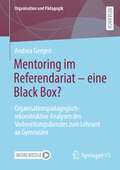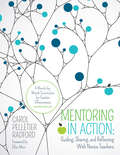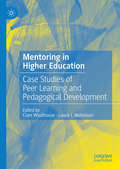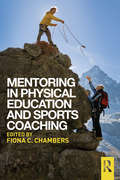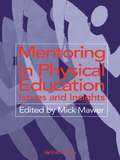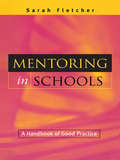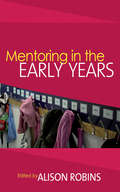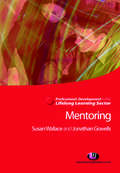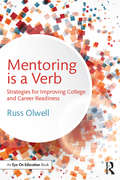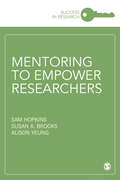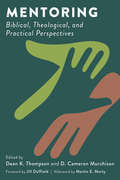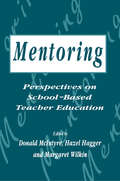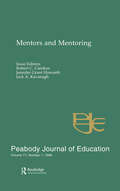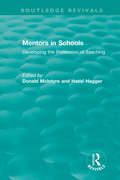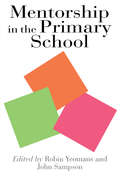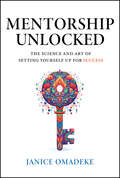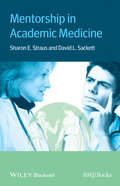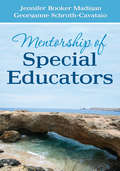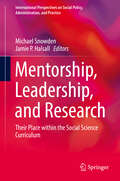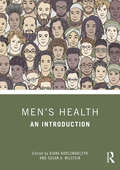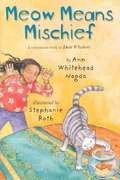- Table View
- List View
Mentoring im Referendariat - eine Black Box?: Organisationspädagogisch-rekonstruktive Analysen des Vorbereitungsdienstes zum Lehramt an Gymnasien (Organisation und Pädagogik #37)
by Andrea GergenDie vorliegende rekonstruktive Studie befasst sich mit den Orientierungen von Mentor*innen im Vorbereitungsdienst zum Lehramt an Gymnasien, da nach wie vor ein Forschungsdefizit in Bezug auf das organisationale Lernen von (Begleit-)lehrkräften in der zweiten Phase der Lehrkräftebildung, ihre pädagogischen Praktiken, ihre kollektive Professionalisierung und die damit implizierte Schulentwicklung besteht. Mentoring im Referendariat erscheint als eine Black Box hinsichtlich der Ausgestaltung der formalen, gesetzlichen und administrativen Vorgaben, des Umgangs mit Mentoring als Personalentwicklungsinstrument, des Lernens in, von und zwischen Organisationen und hinsichtlich seiner Bezüge zu pädagogischer Professionalität und Professionalisierung. Außerdem gilt die Schule als organisationaler Rahmen des Mentorings im Vorbereitungsdienst zum Lehramt an Gymnasien als Black Box, da gesetzliche Rahmungen und politische Programmatiken des Referendariats wenig über die Praktiken von Mentor*innen im Rahmen der sozialen Herstellung schulischer Wirklichkeiten und der sie leitenden Orientierungen aussagen. Mit der vorliegenden Studie soll diese Forschungslücke geschlossen werden.
Mentoring in Action: A Month-by-Month Curriculum for Teacher Effectiveness (Corwin Teaching Essentials)
by Carol Pelletier RadfordThe support you need for mindful mentoring and sustainable teacher success! Learn effective mentoring principles you can use as you guide novice teachers through their first years. This practical guide emphasizes a unique approach: mindful mentoring that aligns your mentoring conversations to teaching standards to more systematically prepare novice teachers for their teacher evaluation. You’ll learn how to: Plan mentoring conversations and observations Prevent teacher burnout by sharing social and emotional learning skills Integrate the updated INTASC Standards into mentoring conversations This updated edition provides a robust companion website featuring videos, downloadable forms, and a digital Mentor Planning Guide and Journal for reflection. Use with The First Years Matter, the companion guide for novice teachers!
Mentoring in Action: A Month-by-Month Curriculum for Teacher Effectiveness (Corwin Teaching Essentials)
by Carol Pelletier RadfordThe support you need for mindful mentoring and sustainable teacher success! Learn effective mentoring principles you can use as you guide novice teachers through their first years. This practical guide emphasizes a unique approach: mindful mentoring that aligns your mentoring conversations to teaching standards to more systematically prepare novice teachers for their teacher evaluation. You’ll learn how to: Plan mentoring conversations and observations Prevent teacher burnout by sharing social and emotional learning skills Integrate the updated INTASC Standards into mentoring conversations This updated edition provides a robust companion website featuring videos, downloadable forms, and a digital Mentor Planning Guide and Journal for reflection. Use with The First Years Matter, the companion guide for novice teachers!
Mentoring in Higher Education: Case Studies of Peer Learning and Pedagogical Development
by Clare Woolhouse Laura J. NicholsonThis book explores the role and importance of mentoring as a form of collaborative learning in higher education. While mentoring has become increasingly popular, the definition itself can remain broad and potentially nebulous, and could be applied to a variety of endeavours. The chapters engage with case studies and empirical research from across the globe that respond to concerns raised within a range of cross-disciplinary fields, providing important clarity as to the role of mentoring within higher education. Offering clarity and precision as well as robust qualitative data, this book will be of interest and value to scholars of mentoring in higher education as well as those engaged in mentoring themselves.
Mentoring in Physical Education and Sports Coaching
by Fiona C. ChambersMentoring is a core element of any successful teacher education or coach education programme, with evidence suggesting that teachers and coaches who are mentored early in their careers are more likely to become effective practitioners. Physical education and sports coaching share important pedagogical, practical and cultural terrain, and mentoring has become a vital tool with which to develop confidence, self-reflection and problem-solving abilities in trainee and early career PE teachers and sports coaches. This is the first book to introduce key theory and best practice in mentoring, for mentors and mentees, focusing on the particular challenges and opportunities in physical education and sports coaching. Written by a team of international experts with extensive practical experience of mentoring in PE and coaching, the book clearly explains what mentoring is, how it should work, and how an understanding of socio-cultural factors can form the foundation of good mentoring practice. The book explores practical issues in mentoring in physical education, including pre-service and newly qualified teachers, and in coach education, including mentoring in high performance sport and the role of national governing bodies. Each chapter includes real mentoring stories, practical guidance and definitions of key terms, and a ‘pedagogy toolbox’ brings together the most important themes and techniques for easy reference. This is a hugely useful book for all teacher and coach education degree programmes, for any practising teacher or coach involved in mentoring, and for schools, clubs, sports organisations or NGBs looking to develop mentoring schemes.
Mentoring in Physical Education: Issues and Insights
by Mick MawerThis book examines factors surrounding the partnership between school-based training and mentoring in Physical Education. Contributors look at all angles of the collaboration between schools and higher education institutions, including: How mentor training programs are planned and the issues involved *Trainees' experiences of school-based training and mentoring *The needs of PE mentors in schools *A full explanation of mentoring Drawing on recent findings and the views of physical education teachers in the UK, Australia and the USA, the editor combines a wealth of information on factors which influence mentorship and the effectiveness of school-based partnership schemes.
Mentoring in Schools: A Handbook of Good Practice
by Sarah FletcherMentoring is a compulsory teaching requirement. This volume provides a practical and up-to-date mentoring guide for all practising mentors working in schools at primary and secondary levels, as well as those responsible for initial teacher training.
Mentoring in the Early Years
by Mrs Alison Robins`This book gives a thorough, detailed account of mentoring, with accompanying case studies which will be invaluable to anyone undertaking the role...this book will encourage readers to develop reflective practice in their settings and that this will help to improve quality' - Nursery World `A valuable and timely contribution to the Early Years field. This will be essential reading for all Early Years practitioners engaged in practice-based learning and will provide valuable guidance for all mentors in the field' - Dr Rose Drury, Lecturer in Early Years, The Open University Mentoring is an important part of good, professional practice. It provides a framework of support for continuous personal and professional development and is integral to the development of quality provision within early years. This book is designed as a guide for all those involved in the mentoring process. The roles of the mentor and practitioners are carefully examined and chapters cover the following: o The role of the mentor o The characteristics of a good mentor o How mentoring supports personal and professional development o The diversity of early years settings and professional roles o Case studies of mentoring in practice Chapters include a mixture of relevant theory, practical suggestions, case studies, questions for discussion, activities for personal and professional development and suggestions for further reading. There are suggestions and examples of materials that may be used, and a glossary of key terms.
Mentoring in the Lifelong Learning Sector: Reflections On Mentoring In Film, Television, And Literature (Professional Development in the Lifelong Learning Sector Series)
by Susan Wallace Jonathan GravellsThis text has been revised and updated to take account of the variety of contexts within the Lifelong Learning Sector. It provides a source of guidance, support and training materials for those involved with mentoring within the sector and presents current theory in an accessible way, illustrated with familiar and pertinent examples. The book shows how a system of mentoring can be successfully implemented, monitored and evaluated within a college or other lifelong learning organisation and explores what the experts and theorists have to say about mentoring, to see how well this fits with the reality of day-to-day experience.
Mentoring is a Verb: Strategies for Improving College and Career Readiness
by Russ OlwellThis accessible guide offers school leaders a wealth of strategies to foster a culture where educators engage with young people to encourage college readiness and career success. Based in research and best practices, Mentoring is a Verb explains how to build effective mentoring programs as well as encourage educators to individually mentor students. Olwell breaks down the key elements it takes to forge lasting relationships with students and addresses ways to connect to at-risk students. Packed with actionable steps, this book gives you the tools to help your students set high expectations and goals, recognize and address barriers to success, plan for the future, and reach their post-graduation aspirations.
Mentoring to Empower Researchers (Success in Research)
by Sam Hopkins Susan A Brooks Alison YeungMentorship can be a rewarding experience for both the mentor and the mentee. Within this context, this book provides guidance on how to set up mentorship programmes in your institutions, and the skills of an effective mentor, including: • Mentorship for transition points, • Skills development needed for publication, funding application and networking, • Mentorship for performing supervision duties. This is a practical and easy-to-use guide that draws on the editors’ extensive experience, and an invaluable tool for practitioners, career advisors and academics working in research and skills development.
Mentoring: Biblical, Theological, and Practical Perspectives
by Martin E. Marty Dean K. Thompson Cameron Murchison D Jill DuffieldPositive mentoring relationships are held to be essential to the formation of strong Christian leaders—but why? How can theological and biblical insights inform mentoring relationships? And what do these vital relationships look like across a range of Christian experience? Opening multiple angles of vision on the practice of mentoring, Dean K. Thompson and D. Cameron Murchison here present a group of eminent scholars who explore mentoring from biblical-theological perspectives, within the context of diverse national and international communities, and across generations. CONTRIBUTORS: David L. Bartlett Walter Brueggemann Katie Geneva Cannon Thomas W. Currie Cristian De La Rosa Jill Duffield Elizabeth Hinson Hasty Luke Timothy Johnson Kwok Pui Lan Thomas G. Long Melva Lowry Martin E. Marty Rebekah Miles D. Cameron Murchison Camille Cook Murray Rodger Nishioka Douglas Ottati Alton B. Pollard III Cynthia L. Rigby Dean K. Thompson Theodore J. Wardlaw
Mentoring: Biblical, Theological, and Practical Perspectives
by Martin E. MartyPositive mentoring relationships are held to be essential to the formation of strong Christian leaders—but why? How can theological and biblical insights inform mentoring relationships? And what do these vital relationships look like across a range of Christian experience? Opening multiple angles of vision on the practice of mentoring, Dean K. Thompson and D. Cameron Murchison here present a group of eminent scholars who explore mentoring from biblical-theological perspectives, within the context of diverse national and international communities, and across generations. CONTRIBUTORS: David L. Bartlett Walter Brueggemann Katie Geneva Cannon Thomas W. Currie Cristian De La Rosa Jill Duffield Elizabeth Hinson Hasty Luke Timothy Johnson Kwok Pui Lan Thomas G. Long Melva Lowry Martin E. Marty Rebekah Miles D. Cameron Murchison Camille Cook Murray Rodger Nishioka Douglas Ottati Alton B. Pollard III Cynthia L. Rigby Dean K. Thompson Theodore J. Wardlaw
Mentoring: Getting it Right in a Week (Getting it Right in a Week)
by Jonathan GravellsAre you an effective mentor to your colleagues? Is mentoring in your school or college implemented, evaluated and embedded in a professional and sustainable way? Are you maximising the many benefits of good mentoring? This book is for you if you are a busy classroom teacher or school leader. It provides practical advice and helpful strategies in accessible bite-sized chunks that are brief and to the point. The ideas are illustrated with clear examples, showing how you can put your new-found skills and knowledge into practice day by day. Designed to be read over a week, the book is divided into seven concise chapters to help you become a more skilful and confident mentor.
Mentoring: Perspectives On School-based Teacher Education
by Hazel Hagger Donald McIntyre Margaret WilkinA series of essays on mentoring issues in education, which includes discussion of the political and historical aspects of mentoring, the mentor-student relationship and the generic skills approach to mentoring.
Mentors and Mentoring: A Special Issue of the peabody Journal of Education
by Robert C. Cienkus Jennifer Grant Haworth Jack A. KavanaghThe definition and parameters of teacher education have recently been changed by the concept of mentoring. Supporters of the concept maintain that it is an effective technique for inducting and retaining new teachers, but who and what are mentors, and what attributes do they possess? Previous research has identified collaboration, enthusiasm, emotional commitment, and sensitivity as the necessary traits of an effective mentor. It has also been found that mentors are available, give immediate feedback, listen attentively, and collaboratively solve problems with mentees. Epistemological structures that best serve the mentor-novice relationship, gender issues between mentors and protégés, and moral development orientations within the mentor-intern relationship have also been investigated. Thus, mentoring is a complex activity that involves a mentor, an intern or novice, and a process within a predetermined structure. The articles in this special issue validate the fact that the terms "good mentor" and "effective mentoring relationship" often elude easy definition. However, a common theme emerges: The mentor-mentee relationship is a transformative one that can change the course of one's life.
Mentors in Schools: Developing the Profession of Teaching (Routledge Revivals)
by Donald McIntyre and Hazel HaggerFirst published in 1996 this book brings together the work of teams in six universities involved in school-based partnerships for teacher education. Professionals from Oxford University, the Manchester Metropolitan University, Keele, Sussex, Swansea and Leicester University come together to explore the distinctive work of school-based teacher educators, discussing the role of the teacher mentor in both primary and secondary schools. Topics covered include: mentoring in the primary school, issues in the managing of mentoring, working with new teachers, and mentoring and continuing professional development. All involved in school-based teacher education – whether as mentors, teacher trainers in higher education, school senior management, advisers, or inspectors – should find the range of experience presented here invaluable in their own work.
Mentorship In The Primary School: Mentorship In Action
by John Sampson Robin YeomansFirst Published in 1994. The growing interest in work of mentors within school-based initial teacher training courses in England and Wales is a phenomenon of the recent past. The development of innovative schemes within secondary education, such as the Oxford Internship scheme (Benton, 1990) generated a national debate about the nature of partnership between schools and higher education institutions, which the government joined when it introduced experimental forms of initial teacher education in the Licensed and Articled Teacher schemes (DES, 1988 and 1989). These were extensively school-based, and included both secondary and primary Mentor-like behaviour may come from many sources within a school, and the appointed mentor may engage in such unmentor-like activities as making formal summative assessments of students with career-shaping implications of 'passing' and 'failing'. This volume is an attempt to provide some illumination and indicate some of the central issues to be addressed. However, we hope that the following chapters will provide an informative base from which to launch research into these and other aspects of primary school student teacher mentoring, as well as being of value for those engaged in mentoring and mentor training.
Mentorship Unlocked: The Science and Art of Setting Yourself Up for Success
by Janice OmadekeUnlock the power of mentorship in your journey to success in this practical and inspiring guideWhat is a mentor? Why is having a mentor crucial to success? Or how do you make sure that you're a good mentor? In Mentorship Unlocked: The Science and Art of Setting Yourself Up for Success, veteran entrepreneur and innovator Janice Omadeke delivers an insightful discussion of mentorship, including what it is, how to find a qualified mentor, and how to make mentorship work for you. In the book, she explores the mentorship advice that helped her start a groundbreaking company after studying entrepreneurship and strategic management at MIT and Harvard.You’ll find practical steps you can take to build your own plan for finding the right mentor for you, or for becoming someone else’s trusted advisor. You’ll also discover: Compelling personal anecdotes and quotes from the author’s own mentors that shed light on key issues arising from that unique relationship Contemporary research and data about mentorship Strategies and techniques you can apply immediately to find a mentor or get more value from an existing mentor relationship Perfect for both established and early-career professionals, Mentorship Unlocked is also an essential read for managers, executives, and other business leaders who aim to better understand one of the most powerful types of relationships crucial to success.
Mentorship in Academic Medicine
by Sharon Straus David SackettMentorship in Academic Medicine is an evidence-based guide for establishing and maintaining successful mentoring relationships for both mentors and mentees.Drawing upon the existing evidence-base on academic mentoring in medicine and the health sciences, it applies a case-stimulus learning approach to the common challenges and opportunities in mentorship in academic medicine. Each chapter begins with cases that take the reader into the evidence around specific issues in mentorship and provides actionable messages and recommendations for both correcting and preventing the problems presented in the cases. Accompanying the text is an interactive, online learning resource on mentorship. This e-tool provides updated resources for mentors and mentees, including video clips and podcasts with effective mentors who share their mentorship tips and strategies for effective mentorship. It also provides updated departmental and institutional strategies for establishing, running, and evaluating effective mentoring programs.Mentorship in Academic Medicine provides useful strategies and tactics for overcoming the common problems and flaws in mentoring programs and fostering productive and successful mentoring relationships and is a valuable guide for both mentors and mentees.
Mentorship of Special Educators
by Jennifer C. Madigan Georganne S. Schroth-CavataioThe definitive guide for mentoring special education teachers <p><p> The national shortage and high attrition rate of special education teachers are impediments to serving students with special needs. This book helps meet an essential need for attracting, retaining, and supporting special educators. The authors provide a wealth of research-based tools for professional developers to use in multiple settings, including schools with culturally and linguistically diverse students.
Mentorship, Leadership, and Research: Their Place Within The Social Science Curriculum (International Perspectives on Social Policy, Administration, and Practice)
by Jamie P. Halsall Michael SnowdenThis insightful volume details the implementation and challenges of the Teaching Excellence Framework (TEF), developed in the UK to ensure equal access to higher education for all social classes. It posits that a modern higher education institution requires a robust set of mechanisms - specifically mentorship, leadership, and research - to create high-quality teaching and learning. Noted contributors pose and answer key questions about the TEF in such areas as solution-focused teaching, mentoring for the job market, and social science curriculum development, using best practice examples in the field. These ideas and strategies carry great potential to improve the caliber of teaching and learning in universities, and with it, students’ social mobility.Among the topics covered: · Why have mentoring in universities? Reflections and justifications. · Working with students as partners: developing peer mentoring to enhance the undergraduate student experience. · The employers’ reach: mentoring undergraduate students to enhance employability. · Learn it and pass it on: strategies for educational succession. · Mentoring mentees to mentor. · Interdisciplinarity in higher education: the challenges of adaptability. Mentorship, Leadership, and Research will play a pivotal role in UK higher education since currently there is scant academic literature on practical tools to help universities to succeed at the TEF. A resource with international implications, it should interest sociologists of education and professionals in business strategy and leadership, social work, and community development. Michael Snowden is a Senior Lecturer in Mentoring Studies at the University of Huddersfield, UK. Jamie P. Halsall is a Reader in Social Sciences at the University of Huddersfield, UK. "Given the recent introduction of the Teaching Excellence Framework (TEF) in the United Kingdom, this timely book outlines effective practices to help earn the “Gold” standard. While considering TEF within the current climate of academic competition and critical evaluation, a diverse group of experts lay out why mentoring is one highly effective answer to the TEF standards and without compromising productivity in other service and research agendas. This book is a must read for academics and higher learning administrators alike."Leda Nath, Professor of Sociology, University of Wisconsin
Men’s Health: An Introduction
by Diana And KarczmarczykThis comprehensive book addresses men’s health and wellness in the context of the male psyche, provides up to date research on men’s health, discusses theoretical frameworks, shares perspectives from men and lists consumer resources and tools. Men’s Health explores social, cultural, physical and psychological approaches to men’s health with sections focusing on the psycho-social issues, the body, relationships, healthy living and aging, while taking into account cultural differences. Each chapter: provides a review of the current science and emerging research of the topic; outlines theoretical frameworks, best practices and recommendations for advancing men’s health through service delivery, research, education, policy and advocacy; features a personal assessment tool on the topic; and includes vignettes from men, their friends and families, and care providers. Suitable for students taking undergraduate courses on men’s health and wellness, this broad-ranging textbook is the ideal introduction to the topic.
Meow Means Mischief
by Ann Whitehead Nagda Stephanie RothA stray kitten turns out to be the perfect way to help Rana make friends in her new school and to feel more comfortable with her grandparents, who are visiting from India while her parents are away.
Mercado Financiero para principiantes
by Evan J. Houpt John Border AlejandroAPRENDE: Inversiones en la bolsa para principiantes y las bases del mercado de valores Esta edición mejorada y actualizada está dirigida al inversionista individual que quiere entender el mercado de valores de hoy y tomar decisiones informadas de inversión con el conocimiento y la comprensión general de los mercados financieros. Está escrito en términos fácilmente comprensibles y proporciona una explicación clara de cómo las piezas encajan en el mercado. Los lectores tendrán un conocimiento práctico y detallado del mercado de valores, a un costo mínimo de tiempo y frustración. Los autores animan a los lectores a desarrollar su propia estrategia y estilo de inversión personal a través de la observación y el aprendizaje. El énfasis está en mantener el control sobre su dinero de inversión, ya sea que opte por compras de acciones individuales o un fondo mutuo, o alguna combinación de ambos. Secciones especiales para analizar nuevos e innovadores vehículos de inversión como SPDRs, con un amplio análisis de los cambios en el mercado tras la crisis financiera de 2008. CONTENIDO: Mercado de valores para principiantes Dentro de este libro descubrirá: Varias opciones de inversión Establecer y alcanzar sus metas de inversión Por qué una empresa emite acciones Todo sobre las IPO's Cómo se negocian las acciones Todo sobre las bolsas de valores y los principales índices Cómo leer una gráfica de acciones Análisis Fundamental vs. Análisis Técnico Inversión en Dividendos y DRIPS Cómo elegir un bróker Estrategias de largo plazo y de corto plazo Oportuno, detallado y fácil de leer, Mercado Financiero para Principiantes pertenece a la estantería de cualquier persona que comienza a invertir o quiere una comprensión más amplia del mercado.
